剑桥雅思4Test1听力Section 2答案+解析
雅思4听力真题答案解析
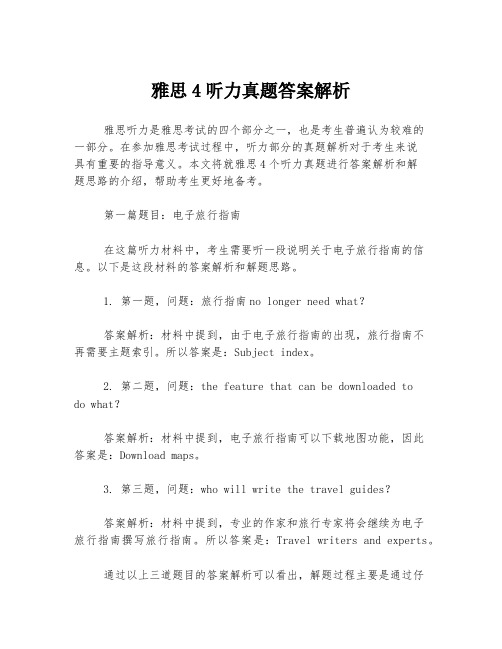
雅思4听力真题答案解析雅思听力是雅思考试的四个部分之一,也是考生普遍认为较难的一部分。
在参加雅思考试过程中,听力部分的真题解析对于考生来说具有重要的指导意义。
本文将就雅思4个听力真题进行答案解析和解题思路的介绍,帮助考生更好地备考。
第一篇题目:电子旅行指南在这篇听力材料中,考生需要听一段说明关于电子旅行指南的信息。
以下是这段材料的答案解析和解题思路。
1. 第一题,问题:旅行指南no longer need what?答案解析:材料中提到,由于电子旅行指南的出现,旅行指南不再需要主题索引。
所以答案是:Subject index。
2. 第二题,问题:the feature that can be downloaded todo what?答案解析:材料中提到,电子旅行指南可以下载地图功能,因此答案是:Download maps。
3. 第三题,问题:who will write the travel guides?答案解析:材料中提到,专业的作家和旅行专家将会继续为电子旅行指南撰写旅行指南。
所以答案是:Travel writers and experts。
通过以上三道题目的答案解析可以看出,解题过程主要是通过仔细听材料中的关键信息来确定答案。
同时,注意材料中特定的词语或表达方式有助于回答问题。
第二篇题目:科学讲座在这篇听力材料中,考生需要听一段科学讲座的内容,以下是这段材料的答案解析和解题思路。
1. 第一题,问题:what is the meaning of "captor hypothesis"?答案解析:材料中讲座者在解释"captor hypothesis"时提到,这意味着某些生物有能力捕获其他生物。
所以答案是:The abilityof certain organisms to capture others。
2. 第二题,问题:what does capsaicin do?答案解析:材料中提到,辣椒素能够刺激痒感受器。
剑四听力答案

剑四听力答案【篇一:剑4听力原文】txt>m: good morning!w: good morning! how can i help you?m: i understand that the school organizes … umm, trips to different…w: yes. we run five every month, three during weekends and two wednesday afternoon trips.m: what sort of places?w: well. obviously, it varies, but always places of historical interest and also which offers a variety of shopping, because our students always ask about that. and then we go for ones where we know there are guided tours because this gives a good focus for the visit.m: do you travel far?w: well, we are lucky here obviously because we are able to say that all our visits are less than three hours drive.m: how much do they cost?w: again it varies, between 5 and 15 pounds a head, depending on distance.m: ah haw: oh and we do offer to arrange special trips if, you know, there are more than 12 people.m: oh right. i’ll keep that in mind. and what are the times normally?w: we try to keep it pretty fixed so that the students get to know the pattern. we leave at 8.30 a.m. and return at 6 p.m. we figure it’s best to keep the day fairly short.m: oh yes and then how do we reserve a place?w: you sign your name on the notice board. do you know where it is?m: ah ha. i saw it this morning.w: and we do ask that you sign up three days in advance so we know we’ve got enough people interested to run it and we can cancel if necessary with full refund of course. m: that’s fine. thanks.m: and what visit sub plan for this term?w: r ight. well. i’m afraid the schedule hasn’t been printed out yet. but we have confirmed the dates and planed the optional extra visits, which you can also book in advance if you want to. m: oh that’s all right. and if you can just give some ideas of the weekend ones so i can, you know, work out then to see friends and such i…w: oh sure. well, err the first one is st. ives. that’s on the 13th of february and we will have only 16 places available because we’re going by mini bus. and that’s the day in town w ith the optional extra of visiting the hepworth museum.m: all right. yes ah. that sounds good.w: and then there’s a london trip on the 16th of february. and we will be taking a medium size coach so there will be 45 places on that. and let’s see the opt ional extra is the tower of london.m: oh, i’ve already been there.w: yam. after that is bristol on the 3rd of march.m: where?w: bristol. b-r-i-s-t-o-l.m: okay.w: that’s in a different mini bus with 18 places available. oh and the optional extra is visit to the s.s. great britain.m: okay.w: we’re going to salisbury on the 18th of march. and that’s always the popular one because the optional extra is stonehen ge. so we’re taking the large coach with 50 seats. m: oh good.w: and then the last one is to bath on the 23rd of march.m: oh yes, is bath the roman city?w: yes, that’s right. and that’s in the 16 seats mini bus.m: and where’s the optional visit?w: it’s to the american museum, well worth visit.m: okay, that’s great. and thanks all that.w: my pleasure. oh by the way, if you want more information about any of the trips, have a look in the student newspaper.m: ok.w: or have a word with my assistant. her name is jane yentob. that’s y-e-n-t-o-b. m: all right. i’ve got that. thank you very much for all your help.w: you’re welcome. i hope you’ll enjoy the trips.test1_section2good afternoon everybody and welcome to riverside industrial village. to start yourvisit, im just going to give you a brief account of the history of the museum before letting you roam about on your own. i wont keep you long. ok?now from where were standing youve got a good view of the river over there. and it was because of this fast flowing water that this site was a natural place for manufacturing works. the water and the availability of raw materials in the area, like minerals and iron ore, and also the abundance of local fuels, like coal and firewood, all made this site suitable for industry from a very early time.water was the main source of power for the early industries and some of the water wells were first established in the twelfth century, would you believe? at that time, local craftsmen first built an iron forge just behind the village here on the bank near the river. by the seventeenth and eighteenth centuries, the regions rivers supported more than 160 water mills and many of these continued to operate well into the nineteenth century. but then the steam engine was invented and then the railways came and the centres of industry were able to move away from the rivers and the countryside and into the towns. so industrial villages like this one became very rare. so thats the history for you. if youd like any more information, you can ask me some questions, or you can read further in our excellent guidebook.now i’m going to give you a plan of the site and i’d just like to point out where【篇二:剑桥ielts.4.听力答案】txt>test 1 answer key1. shopping / variety of shopping2. guided tours3. more than 12 / over 124. notice board5. 13th february6. tower of london7. bristol8. american museum 9. student newspaper 10. yentob 11. coalfirewood 12. local craftsmen 13. 16014. woodside 15. ticket office 16. gift shop 17. (main) workshop 18. showroom 19. cafe 20. cottages 21. a 22. c 23.e 24. b 25. g 26.f 27. c 28. d 29. a30. b31. cities / environment 32. windy33. humid34. shady / shaded 35. dangerous 36. leaves 37. ground38. considerably reduce / decrease / filter 39. low40. space / room1.c2.c3.b4.b5.a6.cathedral7.markets8.gardens9.art gallery10. climb the tower / see the view 11. c 12. b 13. a 14. c 15.b 16.c 17. a 18. b19. b 20. a21. collecting data / gathering data / data collection 22. 1,50023. 524. 3,000 – 4,000 25. b 26. c27. media28. survey / research29. london university / london university press 30. 1988 31. c32. a33. mass media / media34. academic circles / academics / researchers 35. specialist knowledge / specialized knowledge 36. unaware37. individual customers / individual consumers / individuals38. illegal profit / illegal profits 39. d 40. etest 4test 31.1-1/2 years2.forest / forrest3.academic4.thursday5.b6.b1.college dining room2.office staff3.students4.10th december5.coffee break / coffee breaks6.67.set of dictionaries / dictionaries / a good 7.a8.deposit 9.monthly10. telephone / phone 11. c 12. a 13. c 14. b15. lighting / lights / light16. adult / adults17. (at/the) studio theatre / studio theater 18. the whole family / all the family / families19. (in) city gardens / the city gardens / outdoors 20. young children / younger children / children 21. a 22. b 23. c 24. a 25. b 26. a 27. c 28. b 29. b 30. b31. questionnaire32. approximately 2,000 / about 2,000 33. education34. halls of residence / living quarters 35. traffic, parking36. lecture rooms / lecture halls / lecture theatres / lecture theaters37. (choice of / room for) facilities 38. d, f 39. b 40. a, cdictionary 8.tapes9.photos / photographs 10. speech 11. b 12. a 13. a 14. a 15. b16. 18017. nearest station 18. local history 19. 69020. walking club / local walking club 21. 20 balloons22. units of measurement / measurements measurement units23. rock salt / salt 24. crystals25. string / pieces of string 26. (ordinary/white) light 27. h 28.b 29. e 30.c 31. 79532. tail33. floor / bed / bottom 34. sense of smell 35. a 36. a 37. b 38. b 39. b 40. e/【篇三:剑桥雅思4听力原文加翻译】txt>test1_section1m: good morning!m:早上好!w: good morning! how can i help you?w:早上好!我如何帮助你?m: i understand that the school organizes … umm, trips to different…m:我知道学校组织?嗯,去不同的?w: yes. we run five every month, three during weekends and two wednesday afternoon trips. w:是的。
剑桥雅思4Test1听力Listening Section 1答案+解析
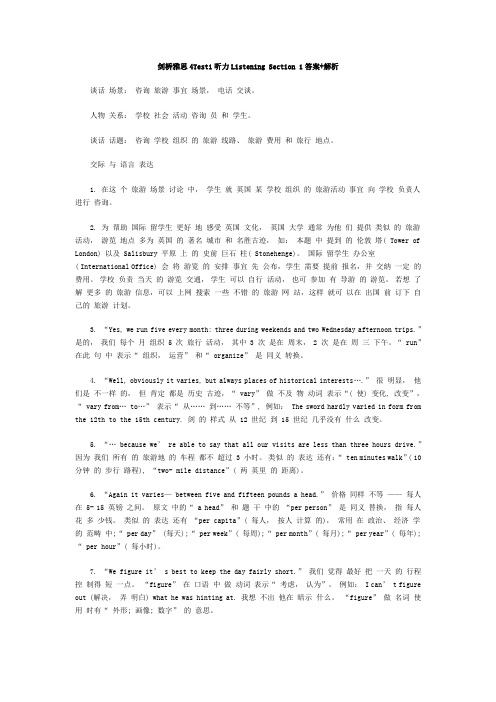
剑桥雅思4Test1听力Listening Section 1答案+解析谈话场景:咨询旅游事宜场景,电话交谈。
人物关系:学校社会活动咨询员和学生。
谈话话题:咨询学校组织的旅游线路、旅游费用和旅行地点。
交际与语言表达1. 在这个旅游场景讨论中,学生就英国某学校组织的旅游活动事宜向学校负责人进行咨询。
2. 为帮助国际留学生更好地感受英国文化,英国大学通常为他们提供类似的旅游活动,游览地点多为英国的著名城市和名胜古迹,如:本题中提到的伦敦塔( Tower of London) 以及 Salisbury 平原上的史前巨石柱( Stonehenge)。
国际留学生办公室( International Office) 会将游览的安排事宜先公布,学生需要提前报名,并交纳一定的费用。
学校负责当天的游览交通,学生可以自行活动,也可参加有导游的游览。
若想了解更多的旅游信息,可以上网搜索一些不错的旅游网站,这样就可以在出国前订下自己的旅游计划。
3. “Yes, we run five every month: three during weekends and two Wednesday afternoon trips.”是的,我们每个月组织 5 次旅行活动,其中 3 次是在周末, 2 次是在周三下午。
“ run”在此句中表示“组织,运营”和“ organize”是同义转换。
4. “Well, obviously it varies, but always places of historical interests….”很明显,他们是不一样的,但肯定都是历史古迹,“ vary”做不及物动词表示“( 使) 变化, 改变”,“ vary from… to…”表示“从……到……不等”, 例如: The sword hardly varied in form from the 12th to the 15th century. 剑的样式从 12 世纪到 15 世纪几乎没有什么改变。
雅思4月1号真题答案解析
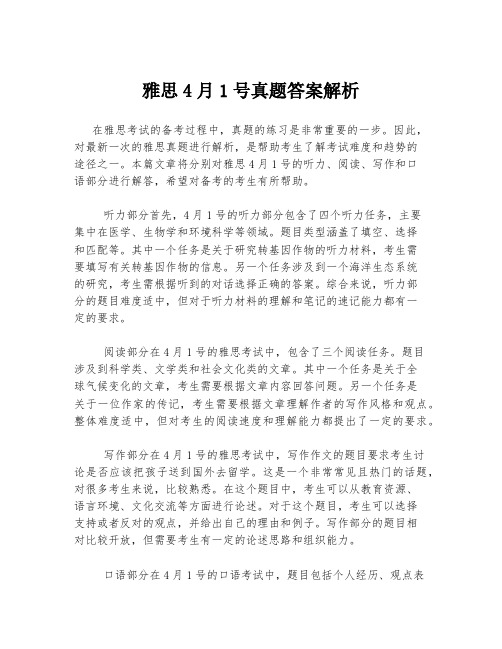
雅思4月1号真题答案解析在雅思考试的备考过程中,真题的练习是非常重要的一步。
因此,对最新一次的雅思真题进行解析,是帮助考生了解考试难度和趋势的途径之一。
本篇文章将分别对雅思4月1号的听力、阅读、写作和口语部分进行解答,希望对备考的考生有所帮助。
听力部分首先,4月1号的听力部分包含了四个听力任务,主要集中在医学、生物学和环境科学等领域。
题目类型涵盖了填空、选择和匹配等。
其中一个任务是关于研究转基因作物的听力材料,考生需要填写有关转基因作物的信息。
另一个任务涉及到一个海洋生态系统的研究,考生需根据听到的对话选择正确的答案。
综合来说,听力部分的题目难度适中,但对于听力材料的理解和笔记的速记能力都有一定的要求。
阅读部分在4月1号的雅思考试中,包含了三个阅读任务。
题目涉及到科学类、文学类和社会文化类的文章。
其中一个任务是关于全球气候变化的文章,考生需要根据文章内容回答问题。
另一个任务是关于一位作家的传记,考生需要根据文章理解作者的写作风格和观点。
整体难度适中,但对考生的阅读速度和理解能力都提出了一定的要求。
写作部分在4月1号的雅思考试中,写作作文的题目要求考生讨论是否应该把孩子送到国外去留学。
这是一个非常常见且热门的话题,对很多考生来说,比较熟悉。
在这个题目中,考生可以从教育资源、语言环境、文化交流等方面进行论述。
对于这个题目,考生可以选择支持或者反对的观点,并给出自己的理由和例子。
写作部分的题目相对比较开放,但需要考生有一定的论述思路和组织能力。
口语部分在4月1号的口语考试中,题目包括个人经历、观点表述和问题回答等。
一个题目是关于一个近期学到的新技能或知识,考生需要描述这个学习过程和效果。
另一个题目是关于喜欢远足的原因,考生需要说出自己喜欢远足的原因和体验。
整体来说,口语部分的题目相对比较简单,但对于考生的口语表达能力和流利度也有一定的要求。
在备考雅思过程中,了解最新一次雅思考试的真题是非常有帮助的。
通过分析和解析真题,不仅可以了解考试难度和趋势,还可以让考生更好地掌握备考的重点和方向。
剑桥雅思4Test1阅读passage2答案解析
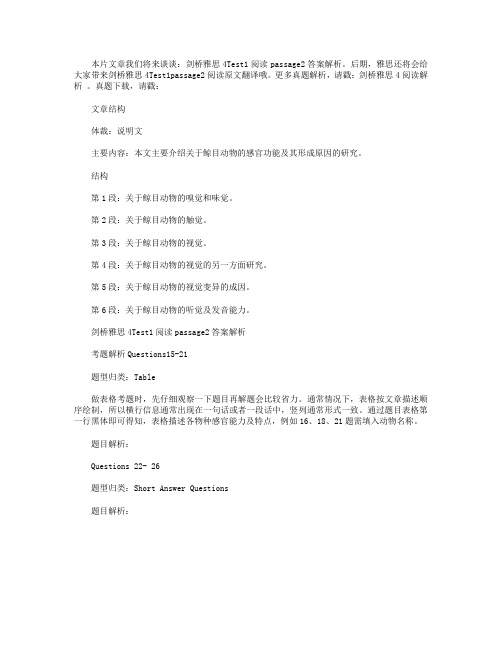
本片文章我们将来谈谈:剑桥雅思4Test1阅读passage2答案解析。
后期,雅思还将会给大家带来剑桥雅思4Test1passage2阅读原文翻译哦。
更多真题解析,请戳:剑桥雅思4阅读解析。
真题下载,请戳:
文章结构
体裁:说明文
主要内容:本文主要介绍关于鲸目动物的感官功能及其形成原因的研究。
结构
第1段:关于鲸目动物的嗅觉和味觉。
第2段:关于鲸目动物的触觉。
第3段:关于鲸目动物的视觉。
第4段:关于鲸目动物的视觉的另一方面研究。
第5段:关于鲸目动物的视觉变异的成因。
第6段:关于鲸目动物的听觉及发音能力。
剑桥雅思4Test1阅读passage2答案解析
考题解析Questions15-21
题型归类:Table
做表格考题时,先仔细观察一下题目再解题会比较省力。
通常情况下,表格按文章描述顺序绘制,所以横行信息通常出现在一句话或者一段话中,竖列通常形式一致。
通过题目表格第一行黑体即可得知,表格描述各物种感官能力及特点,例如16、18、21题需填入动物名称。
题目解析:
Questions 22- 26
题型归类:Short Answer Questions
题目解析:。
剑桥国际英语教程第四册 听力部分答案
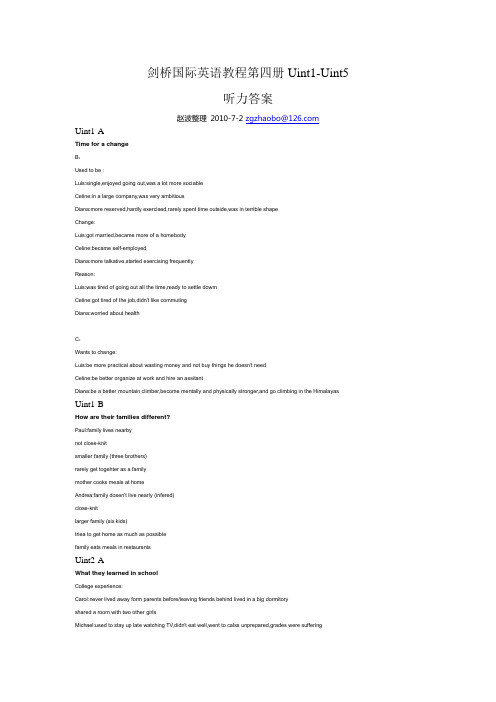
剑桥国际英语教程第四册Uint1-Uint5听力答案赵波整理2010-7-2 ****************Uint1-ATime for a changeB:Used to be :Luis:single,enjoyed going out,was a lot more sociableCeline:in a large company,was very ambitiousDiana:more reserved,hardly exercised,rarely spent time outside,was in terrible shapeChange:Luis:got married,became more of a homebodyCeline:became self-employedDiana:more talkative,started exercising frequentlyReason:Luis:was tired of going out all the time,ready to settle dowmCeline:got tired of the job,didn't like commutingDiana:worried about healthC:Wants to change:Luis:be more practical about wasting money and not buy things he doesn't needCeline:be better organize at work and hire an assitantDiana:be a better mountain climber,become mentally and physically stronger,and go climbing in the Himalayas Uint1-BHow are their families different?Paul:family lives nearbynot close-knitsmaller family (three brothers)rarely get togehter as a familymother cooks meals at homeAndrea:family dosen't live nearly (infered)close-knitlarger family (six kids)triea to get home as much as possiblefamily eats meals in restaurantsUint2-AWhat they learned in schoolCollege experience:Carol:never lived away form parents before/leaving friends behind lived in a big dormitoryshared a room with two other girlsMichael:used to stay up late watching TV,didn't eat well,went to calss unprepared,grades were sufferingWhat they learned form it:Carol:how to get along with others,how to respect other people's opinions and property'how to get along living in tight quartersMichael:how to manege time better,how to be more responsibleUint2-BWhat's their learning strategy?How thay are trying to learn:Frank:study group with the friendsRegina:reading tne manualSonia:taking a class at the community centerProblems they are having:Frank:some people come unprepared,or forget their notes,or don't read the chapter beforehandRegina:too much information to remember,not enough time to study the manualSonia:class is too difficult ,other Ss are better , the teacher is not very good / wanders off the topicUint3-AWhat do you like about the city?City: Deborah:Seoul Todd:Salvador Features: Deborah:one of the ten largest metropolitan areas;cosmopolitan;unique spicy food;noodles,barbecued beef;very old;combination of old and new architecture;efficient subway system;discount shopping Todd:very old;founded by Portuguese;third largest;population of 2 million; built into a cliff;overlokks bay;on two;elevator between levels;beautiful beaches;African influence in music,food,and dance;can watch special kind of dancing;great nightlife;street festivalsUint3-BLife in New York CityQuality-of-life issue:Lindsay:subways on-schedule noise from garbage trucks nightlife:theater and restaurantsEric:cleanliness and safety cold weatherHow do they feel about them:Lindsay:pleased unhappy;they wake her up in the morning excited;wants to do everythingEric:thinks the city has improved in these areas tired of it;ready for a changeUint4-AManaging stressFrequent cause of stress:Lsa:job is hard;has to be organized,disciplined,and self-motivatedSean:traffic,rude driversVictor:demanding doctors,pressured peopleMethod of lowering stress:Lisa:takes a hot bath,watches TV,drinks teaSean;listens to music in car,watches funny movie,goes to friend's houseVictor:goes to gym, goes for a drive in the countryUint4-BI had the widest dream.Dreams:Lucia:back in high school;lost her clas schedule;can't find the main office;late for class;doesn't know what homework she must do;missed an important testRick:in danger but unable to move or scream;in his own bed and senses something coming closer;needs to alert someone,but can't move Meaning:Lucia:she's worried or overwhelmed about something in her lifeRick:not in control of something(once had a dream when one of his children was sick)1.She's 20 and has been sent back to high school with the younger students.2.She has lost her class schedule.3.So she can find out where she is supposed to be .4.Someone or something is coming closer to him with the intention of harming him.5.In his bedroom.6.Warn or save someone.7.One of his children was very sick.Uint5-AHow are they different?Similar:Yashiko:goes to a public high school,wears a uniform,goes to school five and a half days a week,similar interests to friends,plays video games,fan of American movies,likes Brad PittRenato:goes to school from seven until midday,after school studies or plays soccer,on weekends hangs out with friends in shopping centers. Suzanne:worries about grades and getting along with parents goes to classes,attends club meeting,does homework,sleeps late on weekends. Different:Yoshiko:lived outside Japan for six years,learned to speak English while living overseas.Renato:does his own thing ,doesn't always hang out with group,thinks for himselfSuzanne:goes to special school for arts where she studies core subject and music,dance,and artUint5-Bhe different approaches to problem solvingConcerns:Dominique:making expensive purchases;making a mistake and getting stuck with itCarla:hiring the right personWayne:where to spend Christmas holidaysType of problem solver:Dominique :meditative(reads consumer magazines for car ratings,speaks to knowlegeable people in the field,then test-drives the car)Carla:assertive(doesn't like to waste time making decisions,perfers to go with her instincts and act quickly)Wayne:cooperative (talks to a lot of people to get their input,analyze the problem from different people's perspective)。
剑桥雅思4Test2听力Section 2答案+解析
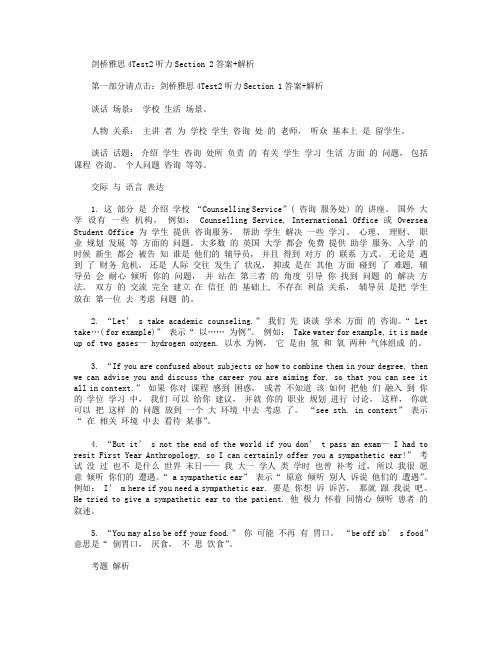
剑桥雅思4Test2听力Section 2答案+解析第一部分请点击:剑桥雅思4Test2听力Section 1答案+解析谈话场景:学校生活场景。
人物关系:主讲者为学校学生咨询处的老师,听众基本上是留学生。
谈话话题:介绍学生咨询处所负责的有关学生学习生活方面的问题,包括课程咨询、个人问题咨询等等。
交际与语言表达1. 这部分是介绍学校“Counselling Service”( 咨询服务处) 的讲座。
国外大学设有一些机构,例如: Counselling Service, International Office 或 Oversea Student Office 为学生提供咨询服务,帮助学生解决一些学习、心理、理财、职业规划发展等方面的问题。
大多数的英国大学都会免费提供助学服务, 入学的时候新生都会被告知谁是他们的辅导员,并且得到对方的联系方式。
无论是遇到了财务危机,还是人际交往发生了状况,抑或是在其他方面碰到了难题, 辅导员会耐心倾听你的问题,并站在第三者的角度引导你找到问题的解决方法。
双方的交流完全建立在信任的基础上, 不存在利益关系,辅导员是把学生放在第一位去考虑问题的。
2. “Let’ s take academic counseling.”我们先谈谈学术方面的咨询。
“ Let take…( for example)”表示“以……为例”。
例如: Take water for example, it is made up of two gases— hydrogen oxygen. 以水为例,它是由氢和氧两种气体组成的。
3. “If you are confused about subjects or how to combine them in your degree, then we can advise you and discuss the career you are aiming for, so that you can see it all in context.”如果你对课程感到困惑,或者不知道该如何把他们融入到你的学位学习中,我们可以给你建议,并就你的职业规划进行讨论,这样,你就可以把这样的问题放到一个大环境中去考虑了。
剑桥雅思4Test4听力Section 1答案+解析
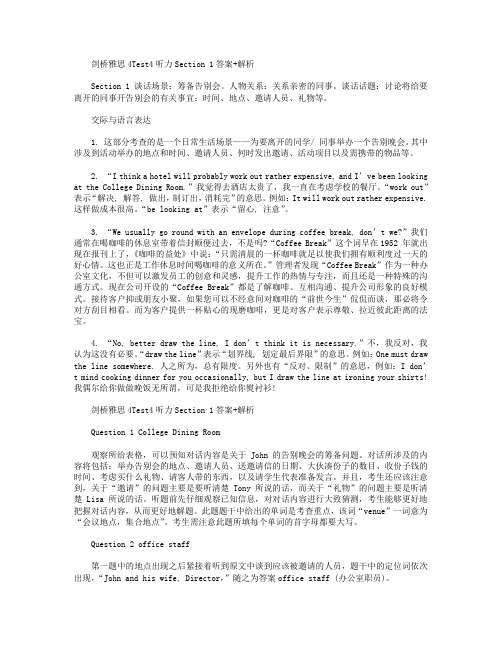
剑桥雅思4Test4听力Section 1答案+解析Section 1 谈话场景:筹备告别会。
人物关系:关系亲密的同事。
谈话话题:讨论将给要离开的同事开告别会的有关事宜:时间、地点、邀请人员、礼物等。
交际与语言表达1. 这部分考查的是一个日常生活场景——为要离开的同学/ 同事举办一个告别晚会。
其中涉及到活动举办的地点和时间、邀请人员、何时发出邀请、活动项目以及需携带的物品等。
2. “I think a hotel will probably work out rather expensive, and I’ve been looking at the College Dining Room.”我觉得去酒店太贵了,我一直在考虑学校的餐厅。
“work out”表示“解决, 解答, 做出,制订出,消耗完”的意思。
例如:It will work out rather expensive. 这样做成本很高。
“be looking at”表示“留心, 注意”。
3. “We usually go round with an envelope during coffee break, don’t we?”我们通常在喝咖啡的休息室带着信封顺便过去,不是吗?“Coffee Break”这个词早在1952 年就出现在报刊上了,《咖啡的益处》中说:“只需清晨的一杯咖啡就足以使我们拥有顺利度过一天的好心情。
这也正是工作休息时间喝咖啡的意义所在。
”管理者发现“Coffee Break”作为一种办公室文化,不但可以激发员工的创意和灵感,提升工作的热情与专注,而且还是一种特殊的沟通方式。
现在公司开设的“Coffee Break”都是了解咖啡、互相沟通、提升公司形象的良好模式。
接待客户抑或朋友小聚,如果您可以不经意间对咖啡的“前世今生”侃侃而谈,那必将令对方刮目相看。
而为客户提供一杯贴心的现磨咖啡,更是对客户表示尊敬、拉近彼此距离的法宝。
- 1、下载文档前请自行甄别文档内容的完整性,平台不提供额外的编辑、内容补充、找答案等附加服务。
- 2、"仅部分预览"的文档,不可在线预览部分如存在完整性等问题,可反馈申请退款(可完整预览的文档不适用该条件!)。
- 3、如文档侵犯您的权益,请联系客服反馈,我们会尽快为您处理(人工客服工作时间:9:00-18:30)。
剑桥雅思4Test1听力Section 2答案+解析
第一部分,请点击:剑桥雅思4Test1听力Listening Section 1答案+解析
谈话场景:旅游场景。
人物关系:演讲者为导游,听众为游客。
谈话话题:介绍 Riverside 工业村的有关情况,其历史、特点以及工业产品。
交际与语言表达
1. 这是一道介绍景点的场景题。
常常是导游或组织者介绍旅游线路或游览地点。
如:曾考过的新西兰“Christ Church”的南极科考站, “agricultural park, industrial village”等。
文中导游介绍了英国的某个工业村庄,谈到了工业化的历史,虽然涉及到一些机械制造中的专业词汇,但是不考查这些专业词汇的拼写。
2. “Now, from where we’ re standing you’ ve got a good view of the river over there.”从我们站的地方看去,那边河流的美景尽收眼底。
“view”表示“景色,美景”。
例如: a fine view of the castle 城堡的美景。
3. “These were built for the workers towards the end of the 18th century and they’re still furnished from that period so you can get a good idea of ordinary people’s living conditions.”这些村舍是在 18 世纪末为工人们建造的,还依然保持着那个年代的装修风格,因此你可以很好地了解当时普通人的生活情况。
“get an idea of”表示“对……所了解”。
4. “If you’ d like to come along, this way please, ladies and gentlemen.”女士们、先生们,如果你们想跟着一起,那我们走这边吧。
“ come along”表示“出现,跟着一起,赶快”的意思,例如: He came along with some friends. 他和几个朋友一同前来。
5. “In the top left corner is the Grinding Shop, where the tools were sharpened and finished. And on one side of that you can see the Engine Room and on the other is the Caf é, which isn’ t an antique, you’ ll be pleased to know, though they do serve very nice old- fashioned teas.”在左上角是研磨室,工具在那里被削尖并完成。
在研磨室的一侧,你可以看到机房,另一侧是咖啡厅,你会很欣喜地发现它不是古代建筑,尽管它的确提供很美味的传统茶。
剑桥雅思4Test1听力Section 2答案+解析
Question 11 coal, firewood
做题前观察已知信息,得知此段话语是关于 Riverside 工业村的情况介绍,先确定会话主题。
此题前提到了 Riverside 工业村能很好地开展工业生产的原因,并提到了“ water, raw material and fuels”, 很明显,会话开始部分提
到这几个单词的时候要特别注意。
已知信息中的“ such as”和录音中提到的“ like”显然是一个意思,应该抓住这个信号词。
同时,考生还应该注意这两个单词的读音和意思及其拼写。
“ coal”意为“煤,煤块”;“ firewood”意为“木柴, 柴火”。
Question 12 local craftsmen
此题较难。
题前给出的信息在文中并没有一模一样的字眼提到,也就是说,此题给出的信息是对原文的相关信息的改写,所以要求考生的听力理解能力稍高。
但是,也不是无据可循。
观察已知信息,不难发现此空要求填入的是人名或一类人,因此只要抓住文中提到的人就可以。
而文中只有一个地方提到了类似信息,可见,做题时应该学会充分利用已知信息来定位。
此空中“ craftsman”意为“工匠,手艺精巧的人,艺术家”。
原文中“ local craftsman”后提到的“ iron forge” (铸铁) 即意味着这是金属制造工业的开端。
Question 13 160
通过预测,判断空格处应该填数字,录音中听到的“more than”是题干中“over”的同义转换,随后听到的数字“160”即为答案。
考生平时应加强对于数字的练习,提高反应速度。
Question 14 Woodside
14- 20 题为地图题,对地图题来说,最重要的是要注意所找地名与图中已知信息之间的关系,以及说话者所提到的第一个地名。
在做题时,要根据已知信息来定位未知信息。
此题相对来说比较容易,因为文中明显提到了“ bottom”一词,比较容易定位。
注意:此题所填单词为地名,首字母要大写。
Question 15 Ticket Office
接着听到“immediately to our right is the Ticket Office.”“to our right”为路标词,其后出现的“Ticket Office”即为答案。
地名为专有名词,注意首字母要大写。
Question 16 Gift Shop
录音中说到“to the left (路标词出现), by the entry gate is the Gift Shop.”在入口处的左边是礼品店。
答案为 Gift Shop。
Question 17 Workshop
此题做题时一定要注意不要把目光局限在 15、 16 题周围,思路要随着文章的叙述变化而变化。
说话者并没有按顺序来介绍地点,而是很快提到了“ at the top”,需要紧紧抓住这个线索词。
Question 18 Showroom。
